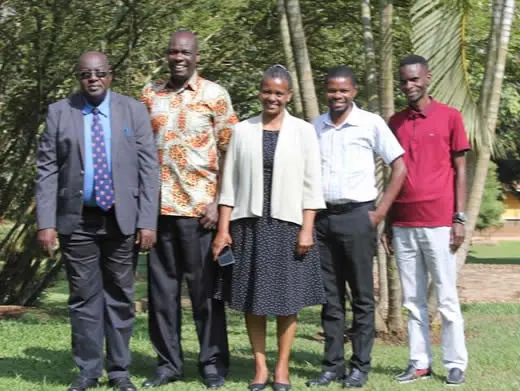By Patty Huston-Holm
In the midst of holding a job and raising a family, many a post-graduate student struggles with a blank computer screen destined for the required research paper. Filling that screen in a language – English – that isn’t a first language is an added obstacle for master’s and doctoral students at Uganda Christian University (UCU).
Help is on the way. It’s already here, actually.
An initiative called CRAWs, which stands for Centre for Research and Academic Writing Services, offers on-line instruction on the various parts of a dissertation and thesis. Led by a team of five within the UCU Directorate of Postgraduate Studies (DPS), the centerpiece of CRAWs is a virtual training module designed to increase understanding of the dozen sections of a research paper. Presenters are subject matter experts from among UCU’s 11 school and faculty areas.
Dr. Godwin Awio, one of the five DPS staff members spearheading CRAWs, is coordinating the module. The primary focus is on assistance to 300 students in the UCU master’s level pipeline.
“Every student can do this,” Awio said. “That’s our main message.”
The on-line module is based on an in-person training conducted by a team of Americans and Ugandans from September 2015 until Covid hit in March 2020. During Uganda’s two-year lockdown, UCU stepped up on-line learning. When the education shutdown ceased, UCU emerged with a plan to conduct nearly all post-graduate courses on line.
The CRAWs module, available without charge to all enrolled UCU post-graduate students, was launched in May of this year. It is designed to introduce participants to critical research and writing skills required to complete a research degree, diploma, publishable articles and other academic reports.
Learning outcomes are:
- Identify features of theoretical paradigms
- Undertake a literature review
- Apply approaches to writing first draft, editing and proof reading
- Apply processes in identifying and responding to publication opportunities
- Apply time management strategies
Participants who attend at least 75% of the training and complete an assessment requirement receive a certificate. Those unable to complete a module can re-take portions with the next offering period.
For the first module in the spring, 200 students enrolled, with 50 receiving certificates. Most completions were from the School of Business, School of Education and Bishop Tucker School of Theology and Divinity. The biggest problem expressed by students in this module was how to do problem statements and how to engage methodology.
The second module was slated Sept. 21 through Oct. 19, 2022. Based on UCU’s 73-page research manual, topics to be covered in addition to basics of writing include theory, methodology, questions, objectives and literature review. Awio is hopeful soon to incorporate virtual coaching that was part of the earlier model with a reminder “we won’t do the work for them.”
All members of the DPS staff have advanced degrees with understanding of frustrations and isolation of working on a research paper. Their content expertise is in social science, development studies and business. All have involvement and understanding of the process.
The five-member DPS team is:
- Dr. Kukunda Elizabeth Bacwayo – director of the directorate
- Dr. Awio – head of publications, coordinating student training and publication of work
- Dr. Joseph Jakisa Owor – head of research and training
- Dickson Tumuramye – assistant registrar, coordinating writing services and staff research training skills
- Jerome Makumbi – assistant registrar, managing post-graduate admissions and training
“We look at the training not just to finish a degree, but to sharpen skills to be used elsewhere and to yield quality papers worthy of being published and used by other researchers,” Awio said. “Analytical skills are valuable in multiple careers.”
Reflecting on his PhD research on employee engagement, Owor noted that beyond his thesis is the realization of the importance of his topic in the corporate world.
“Without involving the whole of your head, heart and hands on something, you cannot succeed or make any difference,” he said. “That’s what I invest in the task of promoting graduate research and training to yield quality output. I always insist on quality and, thereby, step on a few people’s feet.”
Makumbi, who did his master’s research on university employee turnover, said, “Research is knowledge sought for and it is humbling to know you are part of the process of changing the world because it’s through this that new innovation and knowledge is realized.”
Tumuramye, who did his master’s research on women economic empowerment, finds his biggest passion in research that involves children as both subjects and participants of studies, but is able to have compassion and understanding in all academic areas.
Awio said his poverty-surrounded environment and his belief in God drive him to serve students. One favorite scripture is from Colossians 3: 23Whatever you do, work at it with all your heart, as working for the Lord, not for human masters, 24 since you know that you will receive an inheritance from the Lord as a reward. It is the Lord Christ you are serving.


